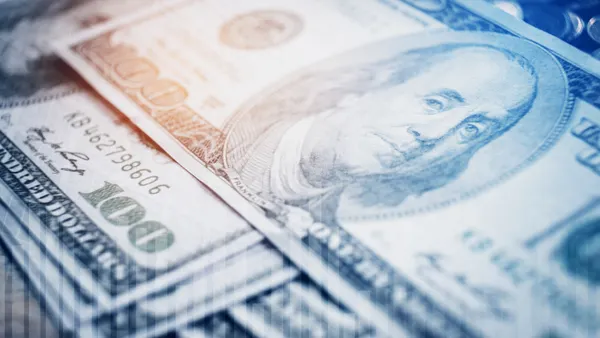Dive Brief:
- Confidence among consumers fell this month as worries about slowing income gains and the cooling job market clouded their current and future outlook on the economy, the Conference Board said Tuesday.
- A gauge of consumer sentiment dipped 1.3 points to 97.4, and a measure of expectations for the coming six months declined, the Conference Board said. The proportion of consumers who say jobs are hard to get rose to the highest level since 2021, and the share who expect their incomes to decrease rose to 12.6% from 11.8% in July.
- “Consumers’ appraisal of current job availability declined for the eighth consecutive month,” Stephanie Guichard, senior economist for global indicators at the Conference Board, said in a statement. “Pessimism about future job availability inched up, and optimism about future income growth faded slightly.”
Dive Insight:
Consumer confidence has drifted lower amid slowing gains in income, worries that Trump administration tariffs will stoke inflation and a decline in hiring and job availability.
Federal Reserve Chair Jerome Powell on Friday highlighted “downside” risks to employment, noting that U.S. payrolls increased on average by just 35,000 each month from May through July compared with an average monthly gain of 168,000 last year.
“Here’s the interesting thing,” Richmond Fed President Tom Barkin said in a Bloomberg podcast released Monday. “We’ve been hearing from businesses for a year and a half that they haven’t been hiring.”
“They also haven’t been laying people off,” he said, noting that unemployment has drifted around the historically low level of 4.2% because of a decline in both the demand and supply of labor.
Policymakers face “a challenging situation” as they confront both the weakening labor market and the likelihood of higher inflation, Powell said in a speech.
Powell said the Fed’s preferred inflation measure, the personal consumption expenditures price index excluding volatile food and energy prices, likely rose 2.9% last month, inching up from 2.8% in June and further from the central bank’s 2% long-run target.
Consumers’ average 12-month inflation expectations this month jumped to 6.2% this month from 5.7% in July, Guichard said.
Write-in responses to the Conference Board’s survey “showed that references to tariffs increased somewhat and continued to be associated with concerns about higher prices,” she said. Also, “references to high prices and inflation, including food and groceries, rose again in August.”
Following President Donald Trump’s shift in trade policy, consumers face an average tariff rate of 18.6%, the highest since 1933, according to the Yale Budget Lab.
Import duties will push-up the short-term price level by 1.8%, equivalent to a $2,400 income loss for the average U.S. household, the Yale Budget Lab said this month.
Consumer pessimism about future business conditions ebbed in August, with the portion expecting conditions to worsen dipping to 21.9% from 22.7% in July, the Conference Board said.
Indeed, economic growth will likely pick up in the second half of 2025 after flagging for the first six months of the year, according to economists.
Gross domestic product will expand at an annual rate of 2.2% this quarter, the Atlanta Fed predicted on Tuesday.














